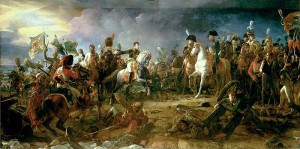The Battle of Austerlitz, fought on December 2, 1805 was a brilliant win for French Emperor Napoleon Bonaparte. The convincing victory, also known as the Battle of the Three Emperors, successfully ended the Third Coalition and caused the dissolution of the Holy Roman Empire. Armies from Austria under Francis I and Russia under Alexander I faced off against the La Grande Armée near the town of Austerlitz now known as Slavkov u Brna in the present day Czech Republic.
The French army numbered 72,000 while the Russo-Austrian fielded 85,000. Napoleon was uncertain of victory but he had a plan to sucker in his enemies and deliver a smashing defeat. He was certain that the Allies would try to attack his southern flank which would play right into his plans. Napoleon was assured that he had some of the finest Generals as well the best trained army on the continent.
The Russians were led by aristocrats who often times bought their positions instead of being given their commissions due to merit. Soldiers were poorly trained and often times abused. Loyalty though of the men was unquestioned and they fought hard. The Austria army was in disarray as a major reorganization was ongoing without the appropriate training for the officer corp. It was a setting ready for disaster.
Emperor Francis I and overall commander General Mikhail Kutusov both felt that caution would be the best battle plan but Alexander I and his nobles pressured for an attack. This was falling right into Napoleon’s hands which he took advantage of.
The battle itself was marked by poor coordination and slow movements by the Allies which not only allowed Napoleon to attack the center of the Allies, but to repulse the thrust at his southern flank. The fight was brutal and often hand to hand but gradually, Napoleon’s men wore their opponents down. By the end of the day, the Allied troops were in full retreat and in panic.
Losses for the allies was catastrophic. They lost fully 37% of their army compared to 13% of the French army. On December 4th, the Austrians signed a truce with Napoleon, followed by the Treaty of Pressburg which effectively took Austria out of the war.
While Tsar Alexander I blamed the outcome on Kutuzov, he also must have realized that Kutuzov had recommended a pull back instead of an attack. If anyone was to blame for the defeat, it should have been Alexander yet his ego wouldn’t allow it. Years later, in 1812, he listened to Kutuzov who successfully defeated Napoleon by harassing the French Army when they invaded Russia instead of directly confronting him.



No comments yet.